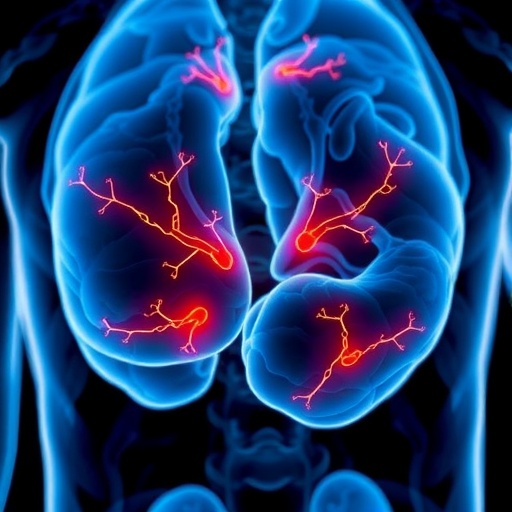In the realm of prostate cancer research, a groundbreaking Phase 2 clinical trial conducted at the University of California, Davis Comprehensive Cancer Center has unveiled insights that may reshape therapeutic strategies for men battling aggressive forms of this disease. Despite advancements in treatment, many men diagnosed with high-risk prostate cancer continue to suffer from high rates of recurrence, posing significant challenges to clinicians and researchers alike. The study in question, soon to be presented at the prestigious American Society of Clinical Oncology (ASCO) annual meeting, offers a window into why some prostate cancers evade existing therapies and how genomic profiling combined with novel drugs could pivot treatment paradigms toward precision medicine.
Central to this innovative approach is the drug niraparib (marketed as ZEJULA), a PARP inhibitor traditionally used in ovarian and breast cancer therapies. PARP inhibitors work by exploiting defects in DNA repair mechanisms, particularly in cancers harboring mutations in DNA repair genes. The trial at UC Davis explored the utility of administering niraparib as a neoadjuvant therapy—that is, prior to surgical intervention—in men diagnosed with prostate cancer characterized by specific genetic mutations in DNA repair pathways. These mutations, which may be germline (inherited) or somatic (acquired), contribute to genomic instability and heightened tumor aggressiveness. By administering niraparib before prostatectomy, researchers aimed to suppress tumor growth, reduce the likelihood of recurrence, and personalize treatment.
The pilot trial enrolled eleven men with high-risk prostate cancer whose tumors exhibited genetic alterations in genes such as BRCA2, MSH6, CHEK2, ATM, SPOP, KMT2C, and KMT2D. These genes play pivotal roles in maintaining genomic integrity through pathways like homologous recombination repair and mismatch repair. Deficiencies in these systems have been linked to increased cancer susceptibility and treatment resistance. The patients received daily doses of 200 mg niraparib over a three-month period before undergoing definitive surgical resection of their tumors. The median age within this cohort was 68 years, with a median prostate-specific antigen (PSA) level of 10.7 ng/mL at diagnosis, placing them in a category at high risk for adverse outcomes.
While the administration of niraparib did not result in pronounced tumor shrinkage prior to surgery, the trial produced valuable data that underscore the complexity and heterogeneity of aggressive prostate cancer at a molecular level. One particularly transformative aspect of the study was the use of circulating tumor DNA (ctDNA) analysis, a liquid biopsy technique that detects fragments of tumor-derived genetic material circulating in the bloodstream. This method enables real-time monitoring of tumor dynamics and genomic evolution without the need for invasive tissue biopsies. The researchers found ctDNA to be a promising biomarker for tracking treatment response and tumor resistance mechanisms, providing actionable information that could inform adaptive therapeutic strategies.
According to Dr. Marc Dall’Era, chief of UC Davis Health’s Department of Urologic Surgery and lead investigator on the study, the variability in patient responses—especially those harboring BRCA2 mutations—highlights the intricate biological underpinnings of prostate cancer and the necessity for more tailored interventions. The study suggests that ctDNA profiling could serve as a dynamic tool for identifying patients most likely to benefit from targeted neoadjuvant therapies such as PARP inhibition. This individualized approach stands in sharp contrast to the one-size-fits-all methodology traditionally employed in prostate cancer management, which often fails to account for the molecular diversity driving disease progression.
Beyond the immediate clinical observations, the trial’s data provides a rich resource for further exploration into the mechanisms of treatment resistance and tumor adaptation. Prostate cancers may develop resistance through a variety of pathways, including restoration of homologous recombination repair competence, alterations in drug metabolism, or clonal selection leading to heterogeneous tumor populations. By integrating genomic sequencing with serial ctDNA monitoring, researchers hope to decode these complex dynamics and identify novel targets for second-line and combination therapies.
Additional contributors to this pivotal research include prominent UC Davis scientists such as Primo Lara Jr., Nicholas Mitsiades, Mamta Parikh, John McPherson, Kenneth Iczkowski, Irene Mitsiades, and Aedric Lim, whose multidisciplinary expertise spans oncology, pathology, biochemistry, and molecular genetics. The study was supported financially by Janssen Pharmaceuticals, underscoring the importance of industry collaboration in advancing cutting-edge oncologic research.
The implications of this trial extend beyond prostate cancer, providing a blueprint for integrating precision medicine into the treatment of various solid tumors characterized by DNA repair deficiencies. The concept of neoadjuvant PARP inhibition, combined with sophisticated molecular surveillance tools like ctDNA assays, offers a paradigm shift with the potential to improve outcomes by arresting tumor progression earlier and more effectively. Furthermore, this approach aligns with the emerging landscape of oncology where treatments are increasingly guided by tumor biology rather than solely by anatomical staging.
Ongoing analyses and future trials will be critical in solidifying the role of PARP inhibitors in early-stage prostate cancer and in refining the selection criteria for patients. Investigations are expected to explore optimal dosing, duration of therapy, combination with other targeted agents or immunotherapies, and the integration of ctDNA dynamics into clinical decision-making algorithms. Such research endeavors promise to unveil new horizons in combating one of the most prevalent and challenging malignancies affecting men worldwide.
As science advances, the insights gleaned from this pioneering UC Davis trial herald a new chapter in our understanding of prostate cancer’s molecular complexity. By harnessing the power of genomics, targeted pharmacology, and non-invasive monitoring, clinicians inch closer to delivering truly personalized care that anticipates and overcomes mechanisms of resistance. For patients burdened by aggressive prostate cancer, these developments offer a beacon of hope and illustrate the transformative potential of translational research in oncology.
Subject of Research: Targeted therapy and genomic biomarkers in aggressive prostate cancer
Article Title: (not provided in the original content)
News Publication Date: June 3, 2025 (date of ASCO presentation)
Web References:
- UC Davis Comprehensive Cancer Center: https://health.ucdavis.edu/cancer/
- ASCO Annual Meeting: https://www.asco.org/
- Niraparib (ZEJULA): https://zejula.com/
References:
- Clinical trial NCT04030559
- Cancer.gov glossary for PARP inhibitor, germline and somatic mutations, and ctDNA
Image Credits: (not provided)
Keywords: Clinical medicine, Health care, Prostate cancer, PARP inhibitors, DNA repair mutations, ctDNA, Targeted therapy, Precision oncology




